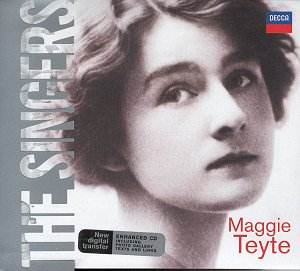Most of the first releases in Decca’s new series, The
Singers, have been devoted to singers from the post-war era and with
something of a bias towards the opera house. This CD is particularly
valuable in restoring to general circulation recordings made by Dame
Maggie Teyte in the 1930s. This period was, perhaps, the peak of a career
which spanned nearly five decades from 1906 to 1955 (and she made some
records as late as 1958).
Maggie Teyte is justly celebrated as an interpreter
of French music which, at first sight may seem surprising since she
hailed from Wolverhampton. This particular expertise arose from her
early training in Paris where she studied with the celebrated tenor,
Jean de Reszke. Two other crucial subsequent mentors were the composer/conductor,
Reynaldo Hahn, and Claude Debussy with whom she studied the title role
of his opera, Pelléas et Mélisande, prior to performing
it in 1908. Sadly, this collection contains but one song by Hahn and
nothing at all by Debussy.
Nonetheless, much of what is included here is of great
interest and Decca are to be congratulated on assembling a programme
which is nicely varied and on making available for the first time on
CD some fascinating and rare material. One item, the song by Armstrong
Gibbs, has never been published before.
Throughout the recital several vocal qualities are
readily apparent. Firstly, Dame Maggie’s diction is of bell-like clarity
throughout. Secondly, she sounds completely at ease with whatever she
sings (for example, she gives the two excerpts from Messager’s Véronique
an irresistible sparkle and lift.) Then there is the production of the
voice itself. Fundamentally, the voice was a light one. However, Dame
Maggie was no soubrette; there is ample depth to the tone and the sound
is evenly produced throughout its range. Needless to say, there is absolute
security on the top notes, which have a lovely, easy ring to them.
The first few tracks are devoted to French music (it’s
a pity there were not more such examples). For me the highlights among
these are a wondrously languorous account of Faure’s Après
un rêve and an exquisitely poised rendition of Hahn’s Si
mes vers avaient des ailes, which includes some gorgeously floated
top notes.
If I’m absolutely honest I would have sacrificed happily
the tracks devoted to English musicals in exchange for more French repertoire.
Candidly, most of the music on these half dozen tracks is pretty second
rate though Teyte still lavishes all her skill and artistry upon this
material. However, in these items the clear diction, so welcome elsewhere,
jars somewhat to me; Teyte is too careful with the words and the result
sounds rather studied, even twee. Certainly these performances are very
much of their period.
The real treasure trove is contained in the second
half of the disc. The last 11 tracks are all taken, I think, from a
1937 BBC broadcast recital (or it may be more than one: the documentation
is a little imprecise on this point). There are two songs by Schumann
and three by Brahms. These are followed by six English songs, most of
them little known. All these items here make their first appearance
on CD.
Unfortunately, the sound quality on these BBC tracks
is a little disappointing. The engineers have not quite tamed the surface
noise and the piano accompaniment is rather relegated to the background.
However, none of this seriously detracts from overall enjoyment. What
a pleasure it is to hear songs and lieder sung by such a pure, bright
and forward voice. I must confess that I found Teyte’s delivery of Quilter’s
Now sleeps the crimson petal too studied. It is a simple, direct
song and to my ears she rather smothers it but other listeners may disagree.
The previously unpublished song by Armstrong Gibbs, which I had not
previously heard, is short and slender but it is lovingly performed.
Despite surface cracks and pops (perhaps the reason it has lain unpublished
all these years) the inclusion of this recording was fully justified.
I’m afraid I can shed no light at all on the composer, Amherst Webber.
As with all the releases in this series, the printed
documentation consists merely of a track listing and a liner note (in
this case by the late John Ardoin). Listeners wanting texts and translations
have to use the disc as a CD Rom, which is fine up to a point but not
much use to listeners who do not have access to a computer. The CD Rom
also includes some photographs, which I must say I found of limited
interest.
Still, the raison d’être of this disc
is the singing of Maggie Teyte and for that it can be recommended wholeheartedly.
The material is of varying musical interest but the performances are
of the first rank. Collectors are advised to snap up this disc while
it is available for it is self-recommending to all connoisseurs of fine
singing.
John Quinn


